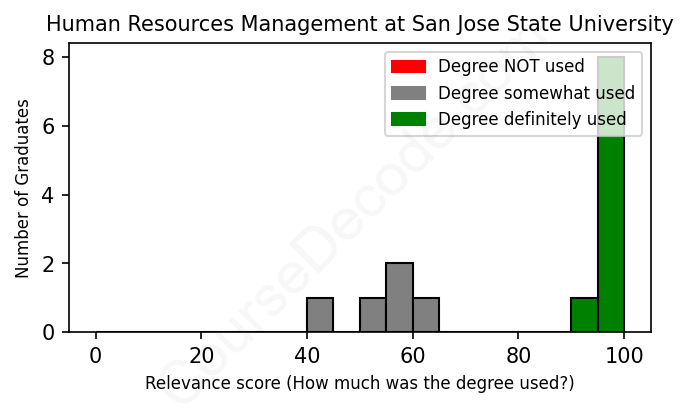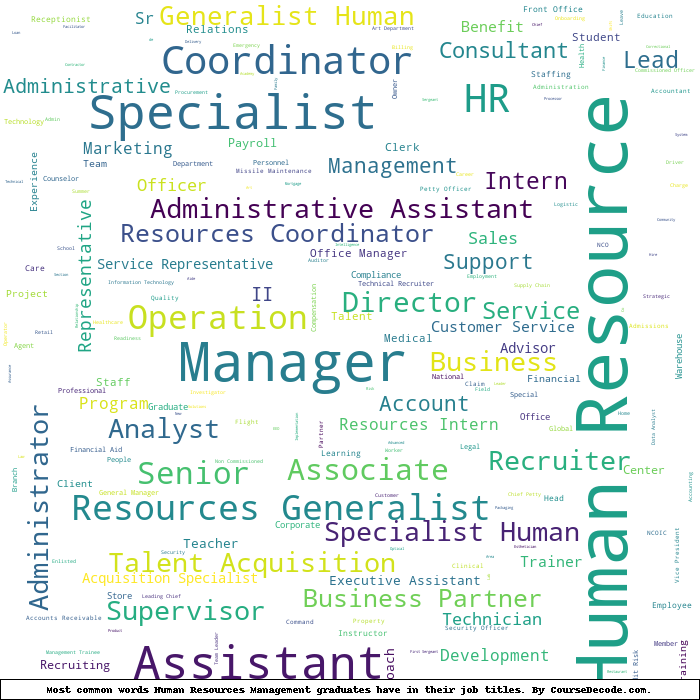
First, some facts. Of the Human Resources Management graduates from San Jose State University we've analyzed , here's how many have used (or NOT used) their degree in their career:

These are estimates based on AI analysis of 14 LinkedIn profiles (see below).
The verdict? Significantly above average. Overall, with an average relevance score of 83%, Human Resources Management graduates from San Jose State University have a much higher likelihood (+16%) of finding work in this field compared to the average graduate across all fields:
And for comparison, here's the chart for all profiles we've looked at across all degrees.
Also, after graduating, only 7% of these graduates have pursued further education other than another Bachelor's degree (such as a Masters degree or other), compared to the average across all profiles of 35%. This suggests a Bachelors degree is enough for most Human Resources Management graduates, and it's normal to look for work straight after graduation.
See the details:
|
Relevance score: 100% We think this person has gone into a career highly relevant to their degree. We think this person has gone into a career highly relevant to their degree.
DEGREE INFOGraduated in 2010 from San Jose State University with a Bachelor's degree in Human Resources Management. No other secondary education since. JOB HISTORY SINCE GRADUATIONHR Manager Trident Electronics Jan 2015 - Present ABOUTNo information provided. |
The top 10 most common jobs done by the graduates we've analyzed (ranked most common to least) are:
When looking at the types of jobs that graduates from San Jose State University with a degree in Human Resources Management have landed, a clear trend emerges. The most common roles include HR Manager, HR Coordinator, Recruiting Coordinator, and various HR analyst positions. These jobs are directly related to the field of Human Resources, requiring knowledge and skills that these graduates learned during their studies. For example, positions like HR Manager and HR Coordinator are fundamental to managing employee relations, recruitment, and HR policies, making them highly relevant and utilizing the expertise graduates gained through their degrees. Even internships and entry-level roles tend to directly apply HR knowledge, which is great for career building in the field.
However, not all jobs have stuck closely to the HR path. Some graduates have taken roles like Customer Service Representative, District Operations Manager, and even project management positions that only touch on HR-related skills minimally. These roles often require transferable skills such as communication and team management but don't directly apply the specific HR principles learned in school. So, while many graduates have found fulfilling careers within Human Resources that closely align with their education, there’s a mix where some have ventured into positions that stray away from core HR responsibilities. In general, those who focused on HR-specific roles seem to be making the most of their degree, proving that a solid foundation in Human Resources can lead to meaningful and relevant career paths.
Here is a visual representation of the most common words in job titles for Human Resources Management graduates (this is across all Human Resources Management graduates we've analyzed, not just those who went to San Jose State University):

Graduates from San Jose State University's Human Resources Management program appear to have embarked on promising career trajectories in the HR field. Many of the alumni's first jobs after graduation are stepping stones into HR, such as HR Coordinator or HR Assistant roles, showing a clear initial focus on human resources functions. In just a few years, it's common for them to move up to more advanced positions—like HR Manager or even HR Business Partner—indicating a solid upward mobility within the industry. For example, graduates from 2010 and 2015 have already secured positions as HR Managers and Directors of Expansion, respectively, suggesting that they’ve been able to leverage their degrees effectively.
Looking further down the line, five to ten years after graduation, many are not just maintaining roles in HR but are progressing to senior positions such as Senior HR Generalist or Management Analyst. A notable trend is the transition of some graduates into specialized functional areas within HR, like benefits analysis or project management, which can provide a broader skill set. While there are some variations in the paths taken—some have detoured into roles related to customer service or project management—most seem to be finding their niche within the Human Resources field. Overall, graduates from San Jose State University appear to be successfully carving out careers that align well with their Human Resources Management education.
Getting a Bachelor’s degree in Human Resources Management at San Jose State University is generally mix of challenging and manageable. Like most business degrees, it comes with its fair share of coursework that dives into subjects like organizational behavior, labor relations, and employment law, which can be pretty in-depth. However, many students find it to be more practical and less theoretical than some other majors, which makes it a bit easier to grasp. You’ll definitely need to be organized and ready to engage with group projects, but if you can handle your time well and stay on top of your assignments, you’ll find it to be a pretty rewarding journey rather than a super hard slog.
Most commonly, in the LinkedIn profiles we've looked at, it takes people 2 years to finish a Bachelor degree in Human Resources Management.
So, looking at these grads from San Jose State University, it seems like they're generally doing pretty well in their careers, especially the ones with a bit more experience. The HR Manager and District Operations Manager have likely landed solid salaries, especially given their roles, which usually pay well. However, some of the newer grads, like the ones working in coordinator positions or internships, might not be making as much just yet, but they’re still gaining valuable experience. Overall, it seems like a mix—some are definitely earning decent money while others are still climbing the ladder, learning the ropes, and hopefully raking in better pay as they go!
Here is a visual representation of the most common words seen in the "about" section of LinkedIn profiles who have a Bachelor degree in Human Resources Management (this is across all Human Resources Management graduates we've analyzed, not just those who went to San Jose State University). This may or may not be useful:

Here are all colleges offering a Bachelor degree in Human Resources Management (ordered by the average relevance score of their Human Resources Management graduates, best to worst) where we have analyzed at least 10 of their graduates:
| College | Score | Count |
|---|---|---|
 San Jose State University San Jose State University
|
83 | 14 |
 Western Governors University Western Governors University
|
71 | 50 |
 Saint Leo University Saint Leo University
|
71 | 12 |
 Davenport University Davenport University
|
71 | 11 |
 Capella University Capella University
|
70 | 15 |
 Rutgers University Rutgers University
|
67 | 14 |
 Southern New Hampshire University Southern New Hampshire University
|
66 | 30 |
 Lindenwood University Lindenwood University
|
64 | 11 |
 DeVry University DeVry University
|
63 | 31 |
 University of Maryland Global Campus University of Maryland Global Campus
|
61 | 22 |
 Upper Iowa University Upper Iowa University
|
61 | 12 |
 Columbia Southern University Columbia Southern University
|
59 | 28 |
 Central Michigan University Central Michigan University
|
57 | 15 |
 Colorado Technical University Colorado Technical University
|
57 | 16 |
 American InterContinental University American InterContinental University
|
56 | 24 |
 University of Phoenix University of Phoenix
|
55 | 90 |
 Ashford University Ashford University
|
52 | 36 |
 American Military University American Military University
|
52 | 13 |
 Park University Park University
|
52 | 21 |
 University of Maryland University College University of Maryland University College
|
51 | 15 |
 Strayer University Strayer University
|
47 | 31 |